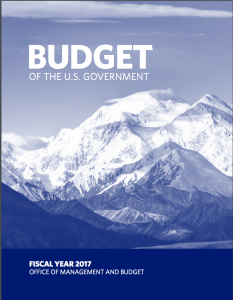President Releases a Disappointing Budget Request for Science
 President Obama on Tuesday released his final Budget Request to Congress, a $4.1 trillion request for FY 2017 that some in the science community have called “aspirational,” which might be a nice way of saying disappointingly unrealistic.
President Obama on Tuesday released his final Budget Request to Congress, a $4.1 trillion request for FY 2017 that some in the science community have called “aspirational,” which might be a nice way of saying disappointingly unrealistic.
Let’s just note at the outset that the President has been a tremendous champion for Federal investments in science throughout his two terms. His Administration has launched a large number of new initiatives on brain science, big data, robotics, clean energy, advanced manufacturing, strategic computing, cyber security, smart cities and more that have brought new funding and new energy to Federally supported science.
That noted, the President’s FY 2017 budget calls for a funding increase of 4 percent to Federal R&D overall, including a 6 percent increase for basic and applied research overall. The National Science Foundation, supporter of 82 percent of all fundamental computer science research in U.S. universities, appears to be one of the big beneficiaries of the increased investments with its budget growing by 6.7 percent under the President’s plan. NSF’s Computer and Information Science and Engineering (CISE) directorate, where most of the Foundation’s computer science research support originates, would be slated for a 6.3 percent increase in budget under this plan.
These would appear to be more-than-respectable increases — particularly as they come while under a difficult budget agreement the President reached with Congress at the end of last year that would cap discretionary spending growth to just 2 percent overall in FY 2017.
However, all is not what it seems. The President, hamstrung by the tight discretionary funding caps (and a congressional majority not interested in revisiting them), is asking for new mandatory spending to make up the bulk of his requested increases at NSF and elsewhere in the budget. Of the $500 million in requested increase at NSF, the President is asking Congress for $400 million in a new “one-time” mandatory funding stream.
Mandatory spending is funding that’s decided by statute or formula — think Social Security, Medicare, Medicaid and Federal food stamp programs. It’s spending that’s essentially on autopilot — Congress doesn’t need to reach agreement on it every year. Creating a new mandatory funding stream for NSF, or any other discretionary program, would require special legislation outside the normal appropriations process…and the approval of Congress with a Republican majority increasingly inclined to cut Federal spending, not create new sources. The likelihood of Congress approving the President’s new mandatory funding streams is probably near zero.
So, when you remove the requested increases in the President’s budget that rely on mandatory spending, the remaining investments look pretty underwhelming. Funding at NSF overall would be up just 1.3 percent compared to FY 2016. Funding in the CISE directorate would be just 0.3 percent above the FY 2016 level, a level that doesn’t even keep pace with inflation.
It’s not hard to understand why the Administration sought to get a little creative given the cap constraints. But this approach — taking an end-run around the discretionary budget caps by designating new “mandatory spending” — is somewhat troubling for the signals it sends to Congress and the appropriators in particular. What they likely see is not that the President has justified a new way to pay for science, but instead that he wouldn’t prioritize science investments under the discretionary caps. It appears that in this budget, other programs were more deserving of the discretionary funds.
We’ll have a more detailed breakdown on each of the key science agencies for computing research in subsequent posts, but the situation is similar at agencies like Defense, National Institutes of Health, NASA, and some parts of the Department of Energy. We knew given the tight caps for FY 2017 that the budget cycle this time around would be challenging for science. It’s unfortunate that we start even further in the hole with this budget request.
More details to come.








